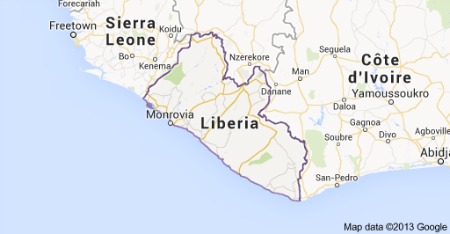 Volunteer students drive out of the University of Liberia on August 30, 2003 (AFP/File, Pius Utomi Ekpei)
Volunteer students drive out of the University of Liberia on August 30, 2003 (AFP/File, Pius Utomi Ekpei)
MONROVIA, Liberia (AP) — After completing high school in June, 20-year-old Lawrence Bondo spent six weeks working with a private tutor to prepare for the University of Liberia’s entrance exam, focusing on the geometry he found so difficult.
Bondo, though, learned earlier this month that he had failed. So had every one of the nearly 25,000 other applicants this year. His cousin was admitted last year before they changed the way the test is graded.
“We live together, eat together and sleep in the same room, so I don’t understand how he’s accepted and I’m not. He did not prepare as much as me,” Bondo said.
Some of the applicants are accusing the university of fraud, and are organizing a march on Friday to demand a refund of their exam fees — nearly $30 per student.
In previous years, candidates had been graded on a curve. Under the new system put in place this year, students were required to earn scores of 50 percent in math and 70 percent in English in order to pass. Around 300 met the math requirement, but no students met the requirements in English, said S. Momolu Getaweh, the university’s public relations chief.
Officials declined to provide copies of the test, which was a multiple-choice exam.
The incident has cast a spotlight on the education sector in this West African nation still recovering from a brutal 14-year civil war that ended in 2003.
Along with the undergraduate applicants, all candidates for graduate programs in law, pharmaceutical studies and six other graduate programs also failed, according to a university press statement.
After the dismal results were in, Liberia President Ellen Johnson Sirleaf laid out a plan Wednesday to relax admission standards to enroll 1,626 undergraduate students as well as a handful of students in each graduate program. She said the test results underscored the need for further reforms.
“We concentrated in the early years on enrolment because we wanted to get all these young kids into schools,” said Sirleaf. “We wanted to get them out of the farms, out of the markets, out of the street selling, and we did that. Enrolment has quadrupled since we started.”
The next step, Sirleaf said, is improving education quality.
“That’s the most difficult task. You got thousands of teachers in our school system, some of them with only a high school education,” she said. “You don’t turn that over in three years or four years or five years.”
Not everyone agrees with Sirleaf’s analysis. The university spokesman suggested the students might be to blame.
“Perhaps they didn’t study, because our students don’t like to study,” he said. “Liberia itself, it’s not a reading public. Go around and ask the people in the street, ‘Did you read a newspaper yesterday?’ They will say no . That culture of not reading, if you bring it to college you’re going to fail.”
Getaweh acknowledged there had been some problems in administering the test in previous years. He said that up until last year, the official in charge of testing used “statistical analysis” to determine how many students would be admitted on a curve. The exact formula was a mystery to every other official at the university, Getaweh said, but the system went unquestioned until last year, when 7,800 students were admitted — more than double the previous average total.
When top university officials went to the official, he refused to explain his methods or provide raw scores, leading to his suspension.
